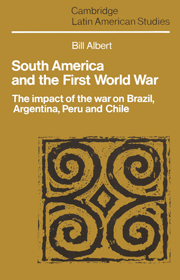Book contents
- Frontmatter
- Contents
- Tables
- Acknowledgments
- Introduction
- 1 Before the War
- 2 The early impact of the War
- 3 The recovery of trade during the War
- 4 Seeking financial solutions
- 5 The War and the growth of manufacturing industry
- 6 The War and the workers
- 7 After the War
- Notes
- Bibliography
- Index
- CAMBRIDGE LATIN AMERICAN STUDIES
1 - Before the War
Published online by Cambridge University Press: 22 October 2009
- Frontmatter
- Contents
- Tables
- Acknowledgments
- Introduction
- 1 Before the War
- 2 The early impact of the War
- 3 The recovery of trade during the War
- 4 Seeking financial solutions
- 5 The War and the growth of manufacturing industry
- 6 The War and the workers
- 7 After the War
- Notes
- Bibliography
- Index
- CAMBRIDGE LATIN AMERICAN STUDIES
Summary
Industrial capitalism was the major revolutionary force in the nineteenth century. It not only transformed the economic, political and social life of much of Europe and the United States, but its influence was also felt throughout the world as over the century it fashioned a multilateral, interdependent world economy to serve its interests. Latin America's role within this system was essentially the same as it had been in the colonial period, to supply raw materials and foodstuffs in exchange for manufactured goods. The decision of the local elites to continue to organize their economies to complement those of Europe, a decision which in general only became clear and strong after some decades of post-independence conflict, was both understandable, and given the prevailing international hierarchy of economic power, realistic. It also admirably suited their own economic interests, which, of course, they equated with the national interest. However, it should not be imagined that there was always agreement or harmony among the various sectors of the elite or between them and foreign capital. There were, for example, varying degrees of intra-elite conflict in all four countries, leading in the most extreme cases to civil war. There were also disputes, often extremely acrimonious ones, between Latin American governments and foreign economic interests. Through all this there was, however, no serious challenge to the basic tenets of development hacia afuera. There was simply no other way to accumulate wealth so quickly.
- Type
- Chapter
- Information
- South America and the First World WarThe Impact of the War on Brazil, Argentina, Peru and Chile, pp. 7 - 36Publisher: Cambridge University PressPrint publication year: 1988

